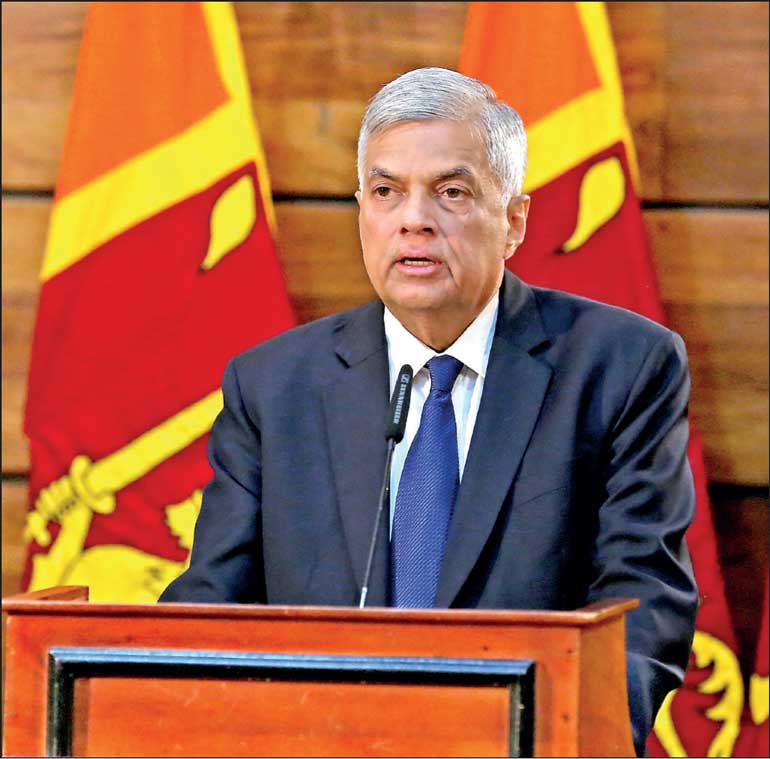Thursday Feb 12, 2026
Thursday Feb 12, 2026
Thursday, 19 January 2023 00:00 - - {{hitsCtrl.values.hits}}

A fundamental tenet of modern governance is that a government must have a mandate from the people before they proceed to impose taxes on them
|
“Man has only to understand himself, to organise the world in a truly human manner according to the demands of his own nature and he will have solved the riddle of our time” – Friedrich Engels

To be or not to be, every passing day our existential angst only deepens.
In our youth we were told that Sri Lanka is a developing country, a description suggestive of an existing state of under-development. To us youngsters, this idea of national backwardness was abstract, we had no experience of any other economy or a lifestyle other than what prevailed in this island, and to be young is a joy. Our access to the larger world came from books and movies; Enid Blyton, Conan Doyle, Agatha Christie, Sean Connery, Clint Eastwood; easily consigned to a genre of exaggerated fiction, dismissible as unauthentic even by our unformed minds.
Naturally, the newspapers tended to highlight the troubles; in the 1970s, race riots in the US, industrial strikes in UK, turmoil in China, wars in the Middle-East, OPEC led oil embargo dominated the news. Our problems in little Sri Lanka only reflected a common global drift. We were a developing country, the future held the promise of development, surely with time we will be better and richer.
Although little thought was given to it, we vaguely assumed a relative parity, these developed countries were perhaps different, but not by much. We assumed that our politicians, policymakers, industrialists, administrators and professionals were a faithful copy of the original version in the originating culture, only in a different skin colour. We had set-up the same services as in England; transport, electricity, entertainment, of course with local titles: the CTB, the CGR, the Electricity Board, Air Ceylon and even social clubs, some even boasting a coat of arms like clubs in England. Symbols of a warrior culture, without the warriors!
With passing years, the illusions of youth give way to the crass realities of a poor country in a state of permanent disorder. When the cultural/industrial evolution that preceded those institutions is absent entirely, it seems the mimic often ends up as a comic distortion of the original idea. It dawned on us only later that in the hands of the imitators, every concept of governance has become a mere device for self-promotion, rather than a matter of principle.
Awareness comes slowly; travel expands the mind while experience is a good teacher. However, they take time, wisdom often is a late arrival. In this era of information unlimited, television provides real time coverage, information that one time needed a study course is now available at a click of a key on your computer, there is no knowledge base beyond reach. We are now able to assess better, comparing and contrasting with other countries and other peoples. There are many countries, against whom we may measure our progress. Almost immediately an uneasy question stares us in the face; does the feebleness of our overall performance suggest a deficiency in the human material available, or the poverty of our philosophy, or, perhaps both?
While globally the trajectory has been towards progress, there are a few countries which have gone from relatively hopeful situations to a basket case. Sadly, Sri Lanka is one of them, a failed country, a people living hopelessly, while an overarching debt burden slowly throttles them. For a satisfactory career, a proper education or even a reliable health service, in short, for a life befitting human dignity, their salvation lies in an entry visa to a foreign country.
It seems the country is doubly jinxed. Those who claim to be working towards a solution in Sri Lanka today, are the very counterfeit leaders of yesterday, those directly responsible for the country’s economic collapse. While the germs of the present crisis, the unpardonable omissions and the bizarre acts of commission of our leaders can be traced as far as early independence years, the immediate causes for the collapse are found in the last quarter century.
The war years were draining, a battered people survived with a desperate resilience, but did not prosper. Making worse a bad situation we had the two-term presidency of Chandrika Bandaranaike (1994-2005) whose easy glibness could not mask her essential incompetence, the economy drastically contracting during this period – one fiasco after another, the war dragged on, they were lost years. Nonetheless, Chandrika Bandaranaike’s less than stellar performance did not come in the way of Mahinda Rajapaksa of her own political party (SLFP), achieving a narrow victory at the 2005 presidential elections over Ranil Wickremesinghe who had by then acquired a lame duck image as a candidate.
Since 1948, the country has been unable to produce a single truly transformational leader. At every election the decision before the voter was to pick the lesser unattractive, inevitably another flawed personality, a person shaped and matured in a distasteful political culture. These pretenders to leadership loudly claim many achievements, other countries meanwhile march ahead quietly. So accustomed are the Sri Lankans to poor standards that they perceive shoddiness as high performance, cheer the charlatans and interpret the vulgarians in heroic terms.
Can something so essentially unwholesome, give rise to anything wholesome?
The Rajapaksa rule (2005) to start with, was the habitual muddle; square pegs in round holes, men out of their depth; there was also a gnawing sense that the machinery of the Sri Lankan Government had fallen into the grip of greasy hands. Then Prabhakaran blundered, overestimating his military strength he challenged the much bigger army in a positional war, attempting to defend a defined territory. His earlier successes on the battlefield inclined him not only to think little of the enemy, but to even disregard simple arithmetical equations. In a way this was an inevitable development, for a considerable period of time, the writ of the Government did not run in that area and the LTTE had begun to think of itself as a de-facto government. For a guerrilla group thriving on stealth and surprise, this mode of fighting was perilous. The protracted war of attrition that began gradually decimated Prabhakaran’s strength.
This is not to take away from the Rajapaksa contribution to the war effort, politically as well as by other means. Here his star shone brightly, Mahinda Rajapaksa’s predecessors were anything but war-time leaders, in comparison he looked Churchillian, the man of the hour. The Rajapaksa commitment to the war effort paid huge dividends, not only did the people endorse him wholeheartedly at the next presidential election, he was emboldened enough to do something a true statesman would never have attempted; to raise his family to an iconic status in the public image. Thus, commonness came to be celebrated; a not so bright, not so honest and not so capable clan became the crucial factor for a country of 23 million people. Here lay the seeds of destruction.
It is obvious that certain countries have got the formula somewhat right while others are struggling with asinine beliefs and ill-digested concepts. A good farmer is not necessarily a good fisherman, a doctor’s son is not automatically a good medical man, it is not certain that a cricketer who scored a century last year will score again this year, installing clocks alone will not bring punctuality, a white colour sarong and a top does not guarantee honesty; the world is complex.
On every score, Sri Lanka seems firmly wedded to the asinine.
We are reaping the consequences now; the country is bankrupt, we are tormented daily by power and water cuts, cooking gas is scarce, raging inflation diminishes us every day, when we do not have to queue for petrol we cheer the Government loudly!
In 2022 the rotten system finally gave way, Gotabaya Rajapaksa the elected President had to flee to a foreign country to escape the wrath of a much wronged people. Hard pressed, the status quo found its answer in Ranil Wickremesinghe; Mahinda Rajapaksa’s alliance and the rump UNP of Wickremesinghe closed ranks, with the aim of restoring what was before. And what existed before? A struggling Third World country, distorted and corrupted by a self-serving political culture, and the politicians had it very good.
Greater the failings of a people, more the need for a Pied Piper. For 80 some years, our bourgeoisie, primarily a comprador class, has laboured to produce its miracle maker, and given forth a man of similar age – Ranil Wickremesinghe! A make believe effort which only amounts to an embarrassing testimony to the failure of a whole social class as well as the ludicrousness of its mentality.
Today, in addition to the unbearable hardships loaded on the people, they are also being taxed to the bone, personal tax threshold is as low as Rs. 100,000 for a month! Compare this with the cost of essentials for an average family of say five, you will appreciate the plight the nation is in. They say this harsh taxation policy is necessary to pay for the monstrous expenses incurred in fanciful projects and to subsidise huge losses made by various Government agencies.
And, who is responsible for these economic disasters? The very same people now taxing us in order to pay for their follies! Here again the deep fault lines of the system are apparent; go to any plush hotel and observe the portly representation of black money; the wheeler dealers, commission agents, black marketeers, stock market manipulators and influence peddlers are partying merrily!
A fundamental tenet of modern governance is that a government must have a mandate from the people before they proceed to impose taxes on them. The American Revolution is a good example of a people refusing to pay taxes imposed by a government which did not represent them.
Considering the recent events, can it be said that the present rulers truly represent the people?
For the answer, we need only to wait until the next election.